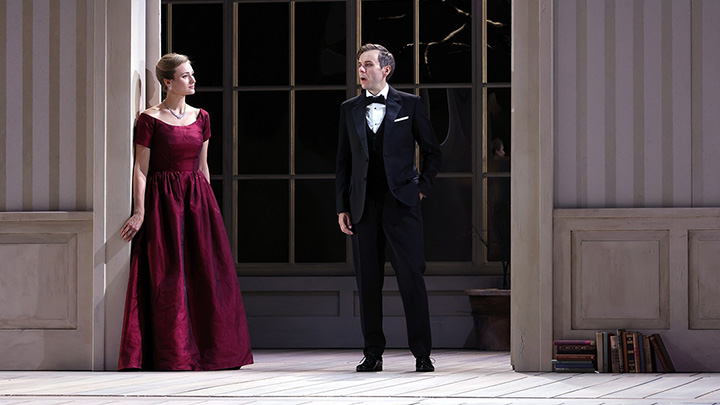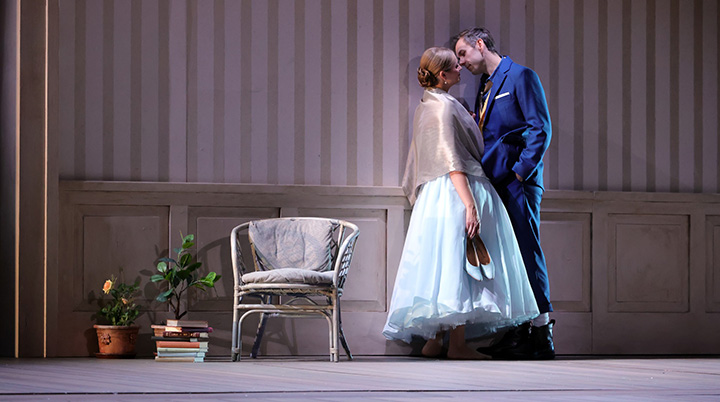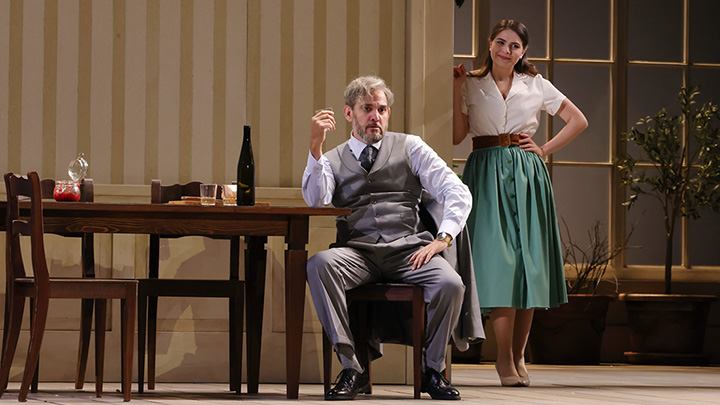This might make him, perhaps, an odd choice of a collaborator for Christof Loy, for whom singers are models and whose productions are slick, seductive, and subversively economical in that John Dexter way. For the sexed-up singers of Loy’s measured stagings, the expression physique du rôle just feels redundant. But against the grain of Bernheim’s self-deprecations (with which I wholeheartedly disagree, by the way), the tenor and the director proved a deft match in La Scala’s production of Massenet’s Werther – only Bernheim’s second outing with the part – in Milan last week.
At first evincing an affable, Stanley Tucci-like sex appeal and a voice with a seemingly endless palate of timbral and dynamic modifications, Bernheim’s slow arrival to Goethe’s tortured poet was worth the wait. He doesn’t brood or smolder – at least not at first – unlike the role’s other leading exponent Jonas Kaufmann. Rather, Bernheim’s hipsterish Werther remains swaggering, youthfully insecure, and occasionally apoplectically desperate. Watching Werther tenderly play with Charlotte and Sophie’s sblings in the first act, you can finally understand what Sophie means when she later says to Charlotte, “Tous les fronts ici sont devenus moroses depuis que Werther s’est enfui.”
Bernheim’s is a fully mature Werther in the details, his anguish over his unrequited love emerging as miraculous and painful shifts in shading and dynamics like the plaintive anguish of the moment he learns about Charlotte’s marriage; though the tone thickens in moments like this, it sounds neither pushed nor bloated. Elsewhere, in his “Ô nature” entrance, it was the clear caress of his attack that impressed, giving way to a beefy voix mixte that notably came back in a glorious diminuendo B-flat to crown a “Porquoi me réveiller?” distinguished for its intensity and restraint. His amber-colored tenor just flowed and flowed indefatigably throughout the evening; this was my first time seeing him perform live and I was smitten.
It was this intensity and intricacy, fluidity and elegance that made Loy such an able partner. His Werther doesn’t deviate from the spare, glamorous midcentury aesthetic for which he is known, but nevertheless highlights the subtle cues of Massenet’s score to create a staging that feels especially alive and detailed. The dangerous blurring of boundaries between indoors and outdoors (a characteristic of Johannes Leiacker’s sets, lit skillfully by Roland Edrich), the emotions kept inside and those we dare to externalize, either directly or masked by art, is a hallmark wisely and subtly extracted from the opera.
Conductor Alain Altinonglu seemed equally in on this take; while the thorniness of the score’s opening chords didn’t much foreshadow the Romantic crush of his reading of the score, his fearlessness towards evoking big, theatrical gestures from the La Scala orchestra (like the especially potent entrance of the saxophone in Charlotte’s Letter Scene) gave the performance an excitement and scope beyond Loy’s hermetic domesticity.
But even that sense of domesticity was carefully wrought; Sophie and Albert, Charlotte’s husband, are more present in this production (Loy even reallocates warning about Albert’s return, that the Bailiff – Armando Noguera—gives to Charlotte following her evening with Werther, to Sophie). Francesca Pia Vitale’s milky soprano was cut through with grit as Charlotte’s doting sister, though Jean-Sébastien Bou was more memorable for his threatening acting than his stinging but unfocused baritone.
Only Victoria Karkacheva, came as a disappointment. Sure, she’s glamorous looking, but she was so lacking in charisma that often times I forgot she was even onstage. What’s more, her indistinct, lightweight wooly mezzo not only lacks depth down below, but the vibrato up top takes on an incessant hammering quality. This was most during the Letter Scene which never took off, garnering a smattering of applause midway through for a “Ces lettres” whose ending barely registered. Too blandly winsome for any real iciness, Karkacheva’s upcoming collaboration with Loy – as Olga in Eugene Onegin in Madrid next year – will probably be a better fit. But I imagine that as Carmen – which she sings in Naples this fall—she probably prefers chamomile to manzanilla.
Abutting a sold-out new production of Turandot starring Anna Netrebko that I’m missing, Werther, absent from La Scala since 1980, may have been the more delicate of La Scala’s summer offerings. But its filigreed intensity has to be at least as great as anything Puccini and his throngs could be mustering later this month.
Photos: Marco Brescia & Rudy Amisano






